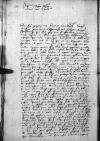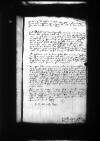⌊⌋ novissime 1532-07-01⌊prima huius1532-07-01⌋ cum generoso domino ⌊Caspare Maczeyo(wski)⌋ significavique per illum, quae tunc se offerebant. Interea non omisi urgere et instare, quo tandem ⌊hinc⌋ absolverer, cum in negotiis, quae mihi nuper per litteras suas Serenissima Maiestas Vestra iniunxit, tum etiam in his, quae res ⌊serenissimae reginalis maiestatis⌋ spectant, ob quas non sine magno meo dispendio hic tamdiu immorari coactus fui. His demum expeditis et nactus has a ⌊caesare⌋ ad Serenissimam Maiestatem Vestram litteras, quae illis respondent, quas Serenissima Maiestas Vestra in negotio Hungarico huc miserat, nolui hunc cubicularium retinere apud me diutius et quemadmodum Serenissima Maiestas Vestra mihi mandavit, ut experirer et diligenter cum caesarea maiestate agerem, an ex animo et serio caesarea et ⌊regia Romanorum maiestas⌋ conventum de concordia instituere pacemque cum adversario inire velint, Serenissimae Maiestati Vestrae sententiam et voluntatem illorum describerem. Feci id ipsum, quoad potui, apud utrumque, prius quam etiam cubicularii isti cum litteris Serenissimae Maiestatis Vestrae huc appulissent, quandoquidem certo intellegeram, quod adhuc esset retinendi ⌊Turcam⌋ et tractandae pacis opportunitas, sed
cf. Ter. Hau. 222 ⌊surdis cecini fabulamcf. Ter. Hau. 222 ⌋. Respondebatur mihi iam ad profectionem contra ⌊Turcam⌋ magnas factas expensas et non restare locum ad induciarum ad pacem tractandam, si tamen sine indutiis opera Serenissimae Maiestatis Vestrae fieri posset, eos hic a pace non esse alienos. Status ⌊imperii⌋ in huius causae negotio plurimum paci afficiebantur, qua de re omnibus modis instabant apud ⌊caesarem⌋, ut per medium Serenissimae Maiestatis Vestrae de componendo adhuc hoc dissidio ageretur, quod se caesar facturum promiserat iussitque scribi ad Serenissimam Maiestatem Vestram litteras in Aprili et misit illarum exemplum statibus imperii, si ad eum modum scriptae placerent factaque sunt illarum litterarum multa exemplaria, quorum his unum adiunxi, sed litteras ad Serenissimam Maiestatem Vestram non esse missas certo compertum habeo. Ad praesens vero, cum litterae Serenissimae Maiestatis Vestrae et serenissimi ⌊Ioannis regis⌋ litterarum exemplum, quod inclusum suis Serenissima Maiestas Vestra misit, coram ⌊caesare⌋ essent lectae, fertur hoc exemplum litterarum Ioannis regis caesarem non mediocriter commovisse, unde dictum fuerat satius fuisse, si hoc litterarum exemplum Serenissima Maiestas Vestra retinuisset et sententiam dumtaxat in his, quae pacem spectant, scripsisset, plus enim illud ad irritandos, quam conciliandos animos profuisse.
Ad ea, quae conveniebant, non sine iustis rationibus respondi.  BCz 247, p. 133 Ex his et ex litteris ⌊caesaris⌋ Serenissima Maiestas Vestra plane et plene intelliget, quae de pacis compositione spes reliqua sit. Sed de his coram, ut spero, Deo bene favente, brevi latius.
BCz 247, p. 133 Ex his et ex litteris ⌊caesaris⌋ Serenissima Maiestas Vestra plane et plene intelliget, quae de pacis compositione spes reliqua sit. Sed de his coram, ut spero, Deo bene favente, brevi latius.
Quod illustrissimum dominum ⌊ducem in Prussia⌋ concernit et de banno hic contra illum publicato nullum adhuc mihi datum est responsum. Accepi tamen ex quibusdam amicis, quod ad litteras Serenissimae Maiestatis Vestrae status ⌊imperii⌋ cum magistro illo ⌊de Gronemberg⌋, qui se magistratus in ⌊Prussia⌋ scribit administratorem, egerunt, quo esset contentus, ut bannum hoc ad duorum annorum decursum suspsenderetur. ⌊Ille⌋ tamen nisi trium mensium voluit dare spatium, quapropter status ⌊imperii⌋ istius pertinaciam heri detulerunt ad ⌊caesarem⌋ rogantes, ut illi mandaret id suscipere, quod votis imperii recusavit. Quid inde futurum Serenissima Maiestas Vestra cum cubiculario ⌊Spiegel⌋ aut ex me fortassis abunde intelliget.
Ad postulationem meam de litteris publicae fidei oratoribus ⌊regis Ioannis⌋ in ⌊Germaniam⌋ mittendis nihil adhuc mihi est responsum neque, ut reor, cum non admodum ab his, quorum interest, pax desideretur, respondebitur, neque etiam in ea postulatione supra id, quod rei ipsius dignitati convenit, futurus sum importunior.
De appa<ra>tu bellico contra ⌊Turcas⌋ multa hic dicuntur, ⌊caesarem⌋ videlicet cum serenissimo ⌊Romanorum rege⌋ supra centum et viginti milia equitum et peditum habiturum magnamque tormentorum vim, ad quam conquirendam a civitatibus ⌊imperii⌋ mittuntur nuntii missusque est pridie magnificus dominus ⌊Cornelius Scepperus⌋ ad ⌊Augustanos⌋ egique cum eo, antequam abiret, ut aliquamdiu negotiis Serenissimae Maiestatis Vestrae inserviret, quod non gravate suscepit, modo semper possit esse in curia. Dicitur etiam alius proficisci a ⌊pontifice⌋ ad ⌊caesarem⌋ ⌊legatus nepos ipsius pontificis de Medices⌋, qui secum fert impensam superinscribed in place of crossed-out s⌈smm superinscribed in place of crossed-out s⌉ super decem milia peditum contra ⌊Turcam⌋ ad sex menses. Quis huius turbae erit exitus, tempus docebit.
Alia pro hoc tempore non restant, quam quod me humillime Serenissimae Maiestati Vestrae ut domino meo clementissimo commendo, quam me spero brevi multis, quae ista tempora concernunt, oneratum, incolumem et felicissimam visurum Deumque precor, ut priusquam hoc fiat me mori non sinat, postea illius divina fiat voluntas.
 BCz 247, p. 133 Ex his et ex litteris
BCz 247, p. 133 Ex his et ex litteris 
